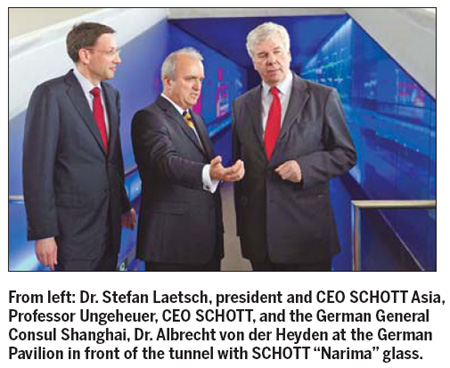The German pavilion at the Shanghai expo has special-purpose glass products and lighting technology thanks to SCHOTT, an international technology group with a core mission of creating products that make lasting improvements in living and working conditions.

Professor Udo Ungeheuer, chairman of the Board of Management of SCHOTT AG, met with Chinese and German journalists at the Expo on the third day of the event to present the SCHOTT products that are being used in the German pavilion. There is more than 1,000 sq m of architectural glass, several hundred lighting elements, 9,000 LEDs that float inside special glass, a 383-sq m building-integrated solar facade made of "Asi Thru" modules from SCHOTT Solar, exhibits devoted to the glass-ceramics "Ceran" and "Zerodur" and exhibition partnerships in the area of Concentrated Solar Power and photovoltaics.
|
Full coverage:

|
"The Expo is fascinating and I am very impressed with the German pavilion and how our products are being put to use here. The architects and exhibition partners have succeeded in creating a masterpiece and we are very proud of the contribution that SCHOTT has made towards it," professor Ungeheuer said.
A trip through the German pavilion leads through various urban spaces that include a tunnel, a harbor, a garden, a depot and a factory. Products from the company have been put to use together with lighting solutions in many of these urban spaces. For example in the entrance area, visitors walk through a 50 m tunnel, whose right wall consists of the color effect glass "Narima" and 9,000 LEDs from SCHOTT. These look as if they are floating freely inside the glass without any visible power supply and then form the Chinese characters for the word "balancity"- the theme of the pavilion, on the wall.
In the Depot area innovative products that make life in the city better will be on display in 90 boxes stacked along the walls. "Here, the focus will be on the art of engineering, as well as design. The stage also needs to be set for these exhibits and they must be illuminated properly. This is where technology from SCHOTT comes into the picture," Peter Redlin, creative director at Milla & Partner, the exhibition and media design partner of the German Pavilion, explains.
About 60 of these boxes will be illuminated using the company's fiber optic and LED technology. The anti-reflective glass called "Amiran" and white flashed opal glass called "Opalika" are also used. SCHOTT experts met with the designers from Milla & Partners to select the right glass and specific types of box lighting, depending on the type of exhibit and its position inside the stack of boxes.
"Ceran" glass-ceramic cooktop panels from SCHOTT can also be found in the depot. Over 100 million such panels have been sold since 1971. This makes "Ceran" the world's top-selling brand of glass-ceramic cooktop panel. Like nearly no other material, it has an impact on our everyday life and is safe and durable.
In the Factory products and processes from Germany that support the Expo theme "Better City, Better Life" will be on show. These will include SCHOTT PTR solar receivers for solar thermal plants and solutions in the area of photovoltaics that will be explained in films at interactive scanner stations.
Visitors will be able to see one of SCHOTT's contributions before they even enter the pavilion. The facade and roof glazing consists of "Asi Thru" photovoltaic modules on top of 383 sq m of surface area convert sunlight into electricity. "I am extremely excited about the idea of having a building-integrated solar facade, in other words the idea of integrating solar cells into a pane of laminated glass and thus being able to avoid using the less attractive solar cells on top of the roof," Lennart Wiechell, Managing Director of Schmidhuber + Kaindl and the architect responsible for the project, said. The facade is designed in such a way that the solar modules not only generate electricity, but are also transparent and allow for daylight to enter the room. This accounts for roughly 10 percent of the incident sunlight for "balancity".
SCHOTT sees its participation in the German pavilion as a unique opportunity to present the company as a German company that is active internationally; to the people of China in particular, but also to the world public. "The Chinese market is playing an increasingly important role for us," Professor Ungeheuer said. SCHOTT has been running its own production facility for "Ceran" glass-ceramic and flat glasses that are used in the household appliance industry since 2002. Production lines for pharmaceutical packaging in the form of high-quality vials and ampoules for medications were added at the site in Suzhou in 2008. "Staying close to our customers is a high priority for us. This is why we place so much emphasis on being able to manufacture high quality products directly on site," he said.

